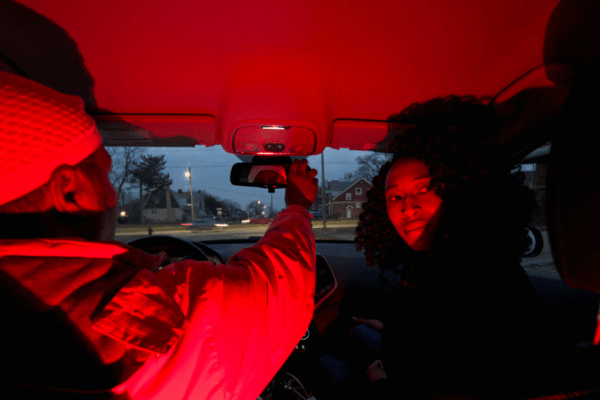Camara Sankofa and Shanelle Thomas are conscientious, dedicated professionals. Mr. Sankofa is an educator. Ms. Thomas is in human services. They also happen to be of African descent. They live quietly, responsibly, and lawfully. They are a couple that should have had nothing to fear when two years ago, on their way home from a day of work, they were pulled over by a Michigan State trooper. Their reasonable expectation should have been that, within moments after the stop, they would receive either a citation or a warning and they would be on their way. But that’s not what happened.
During a stop that lasted nearly 90 minutes, the couple was made to exit their vehicle. They were asked whether they possessed illegal drugs. They were questioned separately. K9 units were called. Their vehicle was emptied and searched. They were made to engage in lengthy discussions about matters having nothing to do with an alleged traffic offense that was supposedly the basis for the stop. And when it was all over, they were told to leave - empty-handed. No citation was issued. No warning was given. They were subjected to about 90 minutes of stress, intimidation and humiliation - for no reason at all.
When considering the experiences of George Floyd, Breonna Taylor, Eric Garner and the ever-growing list of Black people who have lost their lives at the hands of law enforcement, some may be tempted to conclude Mr. Sankofa and Ms. Thomas have no reason to complain. Such thoughts ignore the raw terror they, and thousands of other Black people across the country experience every day each time they are stopped by police officers, regardless of whether they suffer injury or death as a result. It is a terror rooted in their knowledge that far too many people of color have been injured or killed by police officers. It is a terror fueled by a feeling that if during an encounter they too become victims of police violence, they have no one to call. It is a terror that comes over me each time my teen-aged son asks to borrow the car keys.
The ACLU of Michigan has learned that various communities of color have had alarming encounters with MSP, but the ACLU has heard accounts by Black drivers stopped by MSP that are remarkably similar to what Mr. Sankofa and Ms. Thomas endured. It’s all there in each case – the apparently pretextual stop, the questioning about drugs, the order to exit the vehicle, the summoning of K-9s, the vehicle search – everything. It triggered suspicions that led to ACLU Freedom of Information Act requests in 2016 and 2017 that yielded records of racially disproportionate traffic stops.
In letters, meetings, memoranda and private conversations, the ACLU expressed its concern to MSP and strongly urged over the course of several years that the agency engage an expert to take a look at the agency’s policies and the troopers’ practices to determine whether racial profiling occurs routinely. On March 5, 2019, ACLU sent the then new MSP director a comprehensive memorandum detailing the issues and concerns. MSP has steadfastly refused to take the important step of engaging an expert, even though the agency’s own research not only shows that Black drivers are disproportionately stopped but that this disparity has also trended upward. Although African Americans are 14 percent of Michigan’s population, they represented 17 percent of traffic stops in 2017; 19 percent in 2018; and 20 percent in 2019. MSP’s stubborn resistance to transparency left no alternative to a lawsuit that was recently filed by the ACLU on behalf of Mr. Sankofa and Ms. Thomas.
Racial profiling is not only unconstitutional and morally wrong, it’s bad policing. After analyzing substantial data in North Carolina, authors of the book Suspect Citizens explained: “African Americans are much more likely to be searched after a stop than white drivers, but less likely to be found with drugs, guns, alcohol or other forms of contraband after discretionary searches…” These trends have been documented nationally. So, when troopers are busy searching drivers of color and finding nothing, white motorists carrying illegal cargo zoom by without being noticed.
The racially disparate treatment is due largely to racial stereotypes. There is a standing, unacknowledged presumption in some law enforcement circles that people of color are likely to be engaged in illegal drug activity. That presumption was present when Mr. Sankofa and Ms. Thomas were stopped. There was nothing to suggest that this young, professional couple was in any way involved with narcotics. Yet, one of the first things a trooper asked was whether they had drugs in the car. In fact, the troopers were so committed to this stereotype-driven presumption, that they could not bring themselves to accept the couple’s sincere denial of drug involvement. It took dogs, an invasive, fruitless search, and nearly 90 minutes of the couple’s humiliation to finally lead to the troopers’ release of the couple without citations or warnings.
An expert’s comprehensive examination of Michigan State Police race-related practices is long-overdue. Michigan can’t afford to have others experience Mr. Sankofa’s and Ms. Thomas’ trauma.


